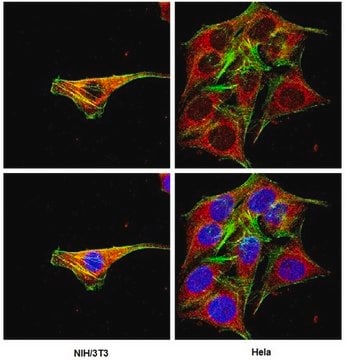SCR508
TAT-CRE Recombinase
TAT-CRE Recombinase is a recombinant cell-permeant fusion cre-recombinase protein consisting of TAT sequence, a nuclear localization sequence (NLS) and it is known to catalyze the site specific recombination event between two loxP DNA sites.
Synonym(s):
Integrase, Recombinase Cre, cre recombinase
About This Item
Recommended Products
biological source
Escherichia coli
Quality Level
recombinant
expressed in E. coli
Assay
>70% (SDS-PAGE)
form
liquid
technique(s)
cell culture | stem cell: suitable
shipped in
dry ice
General description
• If LoxP sites are located on different chromosomes, Cre recombinase will mediate a chromosomal translocation.
• If LoxP sites are oriented in the opposite direction, Cre recombinase will mediate an inversion of the floxed segment.
• If LoxP sites are oriented in the same direction, Cre recombinase will mediate a deletion of the floxed segment.
In this way, placement of the LoxP sites allows genes to be activated, repressed or exchanged for other genes.
EMD Millipore’s TAT-CRE Recombinase is a recombinant cell-permeant fusion protein consisting of a basic protein translocation peptide derived from HIV-TAT (TAT), a nuclear localization sequence (NLS), the Cre protein and an N-terminal histidine tag (H6) for efficient purification of the protein from E. coli.
EMD Millipore’s TAT-CRE Recombinase has been shown to effectively excise STEMCCA viral transgenes from both Human and Mouse IPS cells.
Application
Quality
- Purity: single band around 41 kDa with greater than 70% protein purity on an SDS-PAGE gel
- Functional activity: mediates recombination of LoxP-modified alleles in a HEK293T- Cre reporter cell line
- Endotoxin levels: less than 1 EU/ug protein
Unit Definition
Physical form
Storage and Stability
Storage Class Code
10 - Combustible liquids
WGK
WGK 1
Certificates of Analysis (COA)
Search for Certificates of Analysis (COA) by entering the products Lot/Batch Number. Lot and Batch Numbers can be found on a product’s label following the words ‘Lot’ or ‘Batch’.
Already Own This Product?
Find documentation for the products that you have recently purchased in the Document Library.
Articles
Fibroblast growth factors (FGFs) regulate developmental pathways and mesoderm/ectoderm patterning in early embryonic development.
Fibroblast growth factors (FGFs) regulate developmental pathways and mesoderm/ectoderm patterning in early embryonic development.
Fibroblast growth factors (FGFs) regulate developmental pathways and mesoderm/ectoderm patterning in early embryonic development.
Fibroblast growth factors (FGFs) regulate developmental pathways and mesoderm/ectoderm patterning in early embryonic development.
Protocols
Stem cell reprogramming protocols to generate human induced pluripotent stem cells (iPSCs) including viral and non-viral RNA based methods.
Stem cell reprogramming protocols to generate human induced pluripotent stem cells (iPSCs) including viral and non-viral RNA based methods.
Stem cell reprogramming protocols to generate human induced pluripotent stem cells (iPSCs) including viral and non-viral RNA based methods.
Stem cell reprogramming protocols to generate human induced pluripotent stem cells (iPSCs) including viral and non-viral RNA based methods.
Our team of scientists has experience in all areas of research including Life Science, Material Science, Chemical Synthesis, Chromatography, Analytical and many others.
Contact Technical Service








